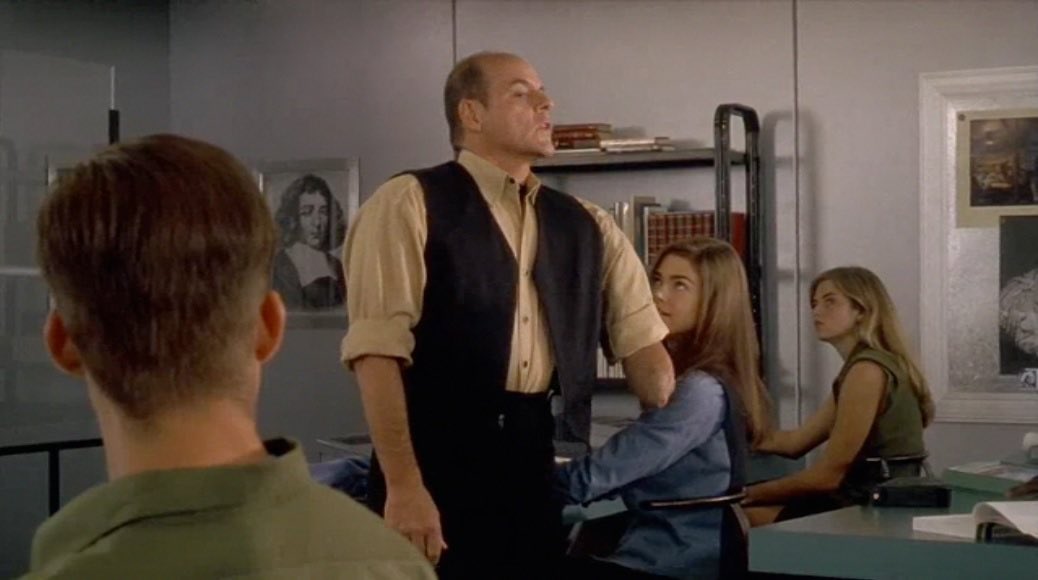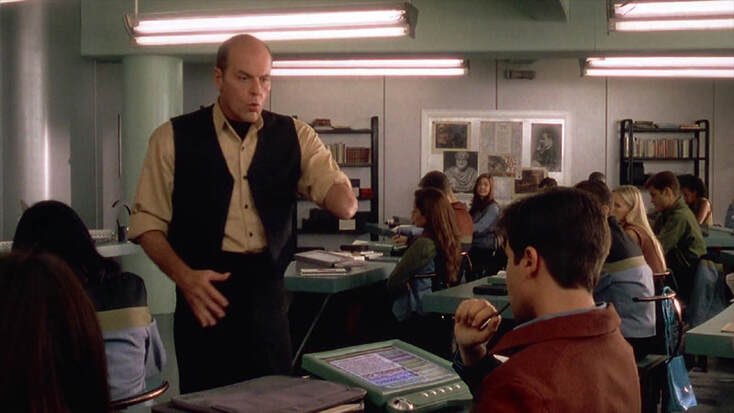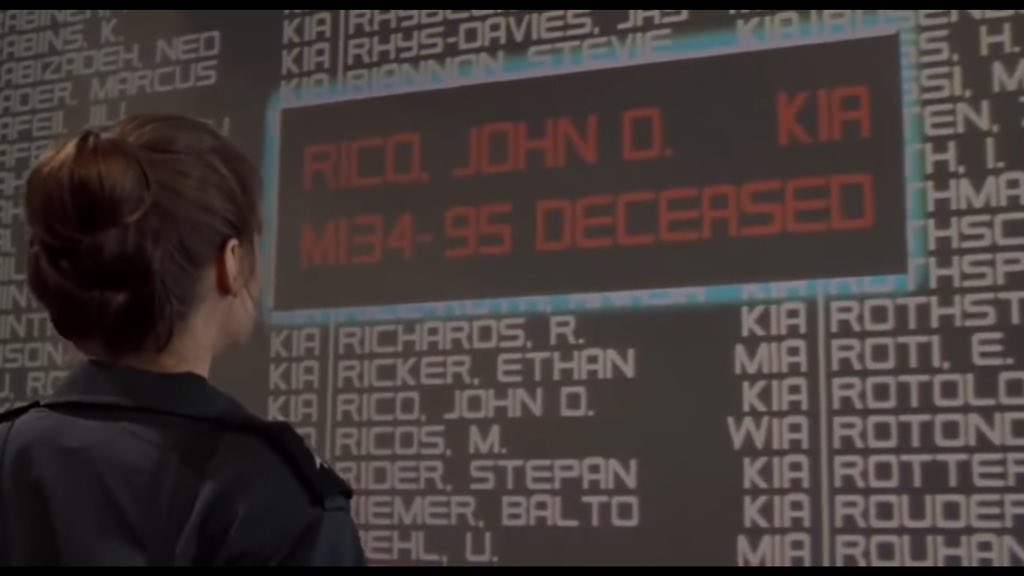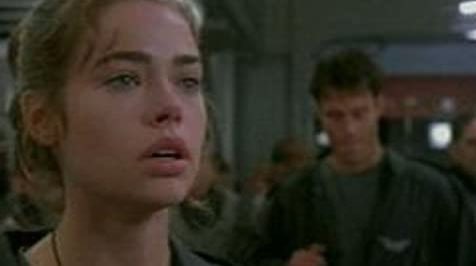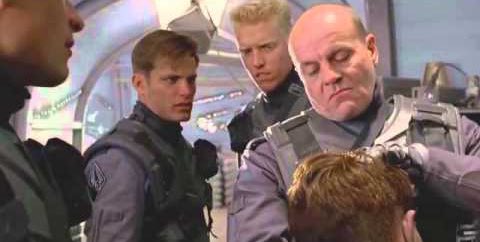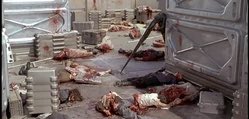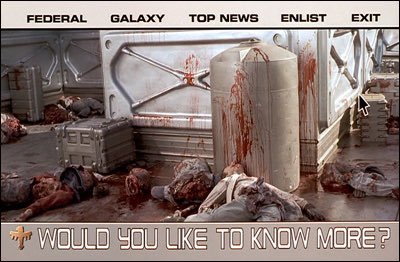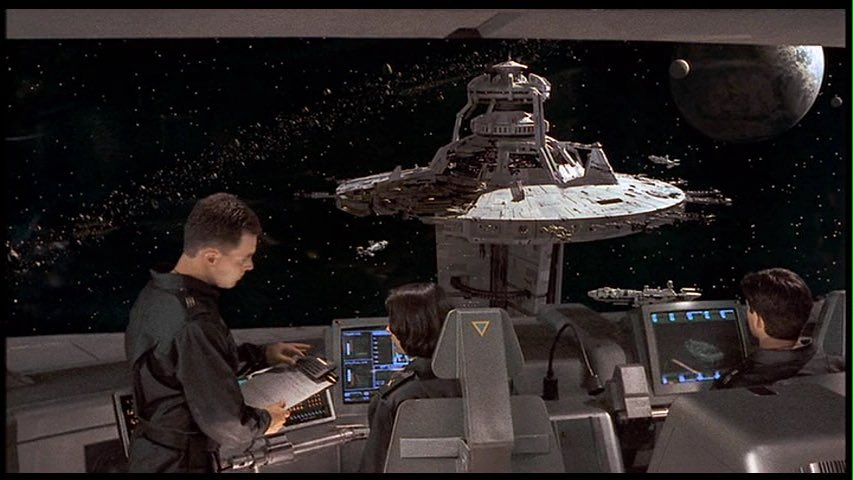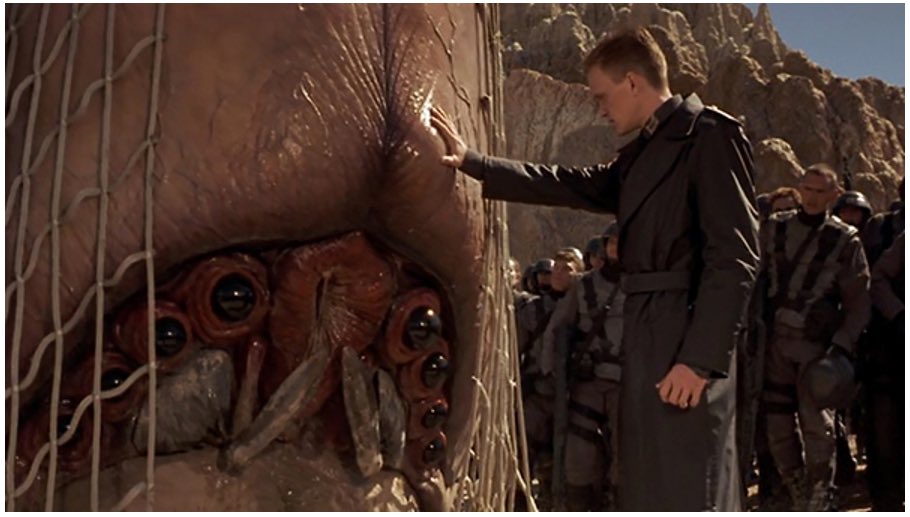#NowWatching “Starship Troopers”
I haven’t watched this in years, but I remember it being the kind of movie that I was astonished people hated.
I’m really glad to see the critical opinion is slowly coming around on Paul Verhoeven’s satirical masterpiece.
I haven’t watched this in years, but I remember it being the kind of movie that I was astonished people hated.
I’m really glad to see the critical opinion is slowly coming around on Paul Verhoeven’s satirical masterpiece.
“Service guarantees citizenship.”
“Starship Troopers” is one of those movies that I remember seeing for the first as an eleven year old kid with my parents when it first came out on DVD/VHS.
And even as a dumb eleven year old kid, I was smart enough to “get” it, to an extent.
“Starship Troopers” is one of those movies that I remember seeing for the first as an eleven year old kid with my parents when it first came out on DVD/VHS.
And even as a dumb eleven year old kid, I was smart enough to “get” it, to an extent.
I wasn’t cultured enough to get that Verhoeven was doing “Why We Fight” and “The Triumph of the Will”, but I was sharp enough to get that “dressing these wholesome all-American characters like Nazis exterminating an enemy they see as cockroaches” wasn’t likely to be an accident.
(I guess eleven year old Darren thought that they were doing “Scar from The Lion King.”
But I’d seen enough film and television to get that this uncanniness was to a very deliberate end.)
But I’d seen enough film and television to get that this uncanniness was to a very deliberate end.)
I should acknowledge that I had (and still have) the best parents, who would make a point on weekends to go to the video store, pick out a movie, and sit down as a family to watch and discuss it.
I remember seeing “Fight Club”, “The Matrix” and so many movies that way.
I remember seeing “Fight Club”, “The Matrix” and so many movies that way.
I can vouch for this: the best way to watch “American History X”, “Fight Club”, “The Matrix” and “Starship Troopers” as an eleven- or twelve-year-old kid is to watch them with your parents as part of a weekly tradition that folds in “Shakespeare in Love” and “Clueless.”
Back on “Starship Troopers”, I’ve been thinking a lot about how the nineties pop culture was dominated by these very mainstream highly cynical reflections on American identity.
This was a decade built around breakout hits like Oliver Stone’s “JFK” and Chris Carter’s “X-Files.”
This was a decade built around breakout hits like Oliver Stone’s “JFK” and Chris Carter’s “X-Files.”
For all the weird culture wars about how modern pop culture is too “political” or whatever, I can’t imagine a major studio paying the equivalent of $173m today for a movie as aggressive and committed in its commentary as “Starship Troopers.”
I suspect it’s an “end of history” thing. With the Cold War over, no mew enemy on the horizon, pop culture was willing to be a bit more introspective and reflective.
The economy was strong. Crime was falling. So there was room to ask awkward questions like this.
The economy was strong. Crime was falling. So there was room to ask awkward questions like this.
Two years before “Starship Troopers” there’d been an argument about how the Smithsonian should portray the fiftieth anniversary of the bombings of Hiroshima and Nagasaki.
It got very heated, but that wouldn’t even have been a debate a decade earlier. https://www.atomicheritage.org/history/controversy-over-enola-gay-exhibition">https://www.atomicheritage.org/history/c...
It got very heated, but that wouldn’t even have been a debate a decade earlier. https://www.atomicheritage.org/history/controversy-over-enola-gay-exhibition">https://www.atomicheritage.org/history/c...
“This year we explored the failure of democracy, how the social scientists brought our world to the brink of chaos. We talked about the veterans, how they took control, and imposed the stability that has lasted for generations since.”
As much as it feels like “Starship Troopers” could only have been made in the nineties, it has aged phenomenally in the years and decades since.
It increasingly feels like there’s a significant portion of the population for whom this dystopia is the perfect idealised future.
It increasingly feels like there’s a significant portion of the population for whom this dystopia is the perfect idealised future.
There needs to be a special term for the point at which Poe’s Law cancels out Godwin’s Law, because that’s really the space in which “Starship Troopers” operates.
And, like “RoboCop”, it’s dazzling to watch as reality has kind of bent towards this insanity.
And, like “RoboCop”, it’s dazzling to watch as reality has kind of bent towards this insanity.
“I sure hope you don& #39;t do anything like that to me.”
“Don& #39;t be afraid. Can& #39;t do human. Yet.”
One of the most delightful things about the opening act of “Starship Troopers” is the way in which the “90210” and “Dawson’s Creek”-esque teen melodrama feels creepy and uncanny.
“Don& #39;t be afraid. Can& #39;t do human. Yet.”
One of the most delightful things about the opening act of “Starship Troopers” is the way in which the “90210” and “Dawson’s Creek”-esque teen melodrama feels creepy and uncanny.
The whole point of “Starship Troopers” is that it looks like *both* Nazi propaganda and classic American recruitment films.
After all, it’s notable how humanity talks about the enemy like Nazis talked about Jewish people or McCarthy-era Americans talked about Communists.
After all, it’s notable how humanity talks about the enemy like Nazis talked about Jewish people or McCarthy-era Americans talked about Communists.
The Barbie and Ken Doll aspect of “Starship Troopers”, casting unbelievably pretty people in their late twenties to play “aw, shucks” teenagers, makes the film feel very deliberately like a Second World War recruitment film.
It’s a delightful - and demented - touch.
It’s a delightful - and demented - touch.
It’s weird that so many contemporary critics missed that this was a deliberately uncanny satire, with Verhoeven deliberately contrasting the innocence and romance of war recruitment films with both bursts of graphic horror and a steadily mounting sense of the uncanny.
Our romantic leads - Van Dien and& Richards - look like they were immaculately chiseled from a rich mahogany, while our comedic support - Busey & Harris - are grinning blonde psychopaths.
There’s something consciously “off” about watching these characters go through the motions.
There’s something consciously “off” about watching these characters go through the motions.
Just in case the audience doesn’t get what Verhoeven is doing, the film’s opening sequence cuts from a recruitment video to a live feed from a massacre in which the lead character is introduced panicking and screaming.
That’s the heart of the movie within two minutes.
That’s the heart of the movie within two minutes.
“It& #39;s war! We& #39;re going to war!”
There’s something in that old Truffaut truism that it’s impossible to make a truly anti-war film, as depicting the act tends towards glorifying it.
I think the best war films find a way around this. (“Dunkirk” is a war film about running away.)
There’s something in that old Truffaut truism that it’s impossible to make a truly anti-war film, as depicting the act tends towards glorifying it.
I think the best war films find a way around this. (“Dunkirk” is a war film about running away.)
“Starship Troopers” works by pushing deliberately and horrifically in the opposite direction.
It plays into all the romance and tropes of the myth of noble war, but pushes so hard that it becomes impossible to take any of it seriously.
But pushes it past the extreme.
It plays into all the romance and tropes of the myth of noble war, but pushes so hard that it becomes impossible to take any of it seriously.
But pushes it past the extreme.
I recall Verhoeven’s argument was that if he made a movie about how fascism inevitably fails, nobody would take it seriously.
So instead, Verhoeven presents a fascist’s ideal world. He trusts that to speak for itself, to be horrifying on its own terms rather than as failure.
So instead, Verhoeven presents a fascist’s ideal world. He trusts that to speak for itself, to be horrifying on its own terms rather than as failure.
The whole point of “Starship Troopers” is that it’s not a failed state by any non-moral metric. It’s as functional as a state like that could be.
And that allows it to be horrific in its own way, because it’s underlying principles are horrific, even when executed perfectly.
And that allows it to be horrific in its own way, because it’s underlying principles are horrific, even when executed perfectly.
“Nothing lives in what was once called the Latin Paradise.”
“Oh, Johnny, it& #39;s us.”
“Starship Troopers” is not an especially subtle movie, but it’s notable how it leaves some of its most unsettling ideas barely articulated.
Buenos Aires is... not very Latin.
“Oh, Johnny, it& #39;s us.”
“Starship Troopers” is not an especially subtle movie, but it’s notable how it leaves some of its most unsettling ideas barely articulated.
Buenos Aires is... not very Latin.
Rico, Ibanez and Flores are... very white. Rico even plays what is very clearly a futuristic version of American football.
The inhabitants of Buenos Aires talk about the Second World War as if they were the United States. It’s a very conscious, very deliberate choice.
The inhabitants of Buenos Aires talk about the Second World War as if they were the United States. It’s a very conscious, very deliberate choice.
“It’s strange. There’s almost no wounded at all.”
It’s hard to say this without sounding mean, but it’s an ingenious choice for Verhoeven to go with cast members who maybe aren’t the strongest actors, and who instead just have this numb and lifeless quality.
It’s hard to say this without sounding mean, but it’s an ingenious choice for Verhoeven to go with cast members who maybe aren’t the strongest actors, and who instead just have this numb and lifeless quality.
There’s a sequence where Carmen just walks through a room filled with mangled bodies writhing in agony, and Denise Richards has... nothing going on.
It’s a very deliberate stylised choice. It underscores how these idealized soldiers aren’t real people. They’re just husks.
It’s a very deliberate stylised choice. It underscores how these idealized soldiers aren’t real people. They’re just husks.
Of course, this is a risky creative gambit, and it’s something that leaves “Starship Troopers” open to the response that it received.
The film trusts the audience to understand the dissonance between the horror it depicts and Carmen’s dull numbed reaction to it.
The film trusts the audience to understand the dissonance between the horror it depicts and Carmen’s dull numbed reaction to it.
If the audience looks to the characters to understand the film, instead of understanding the film through the characters’ relationship to the film, then you end up with the surface-level criticisms that defined so much of the response to “Starship Troopers.”
“They sucked his brain out.”
It’s not a particularly subtle metaphor, but the imagery of the bugs draining and dominating the brains of their human victims is an interesting parallel to the brainwashing of these pretty young vapid people.
Are they using their brain anyway?
It’s not a particularly subtle metaphor, but the imagery of the bugs draining and dominating the brains of their human victims is an interesting parallel to the brainwashing of these pretty young vapid people.
Are they using their brain anyway?
The idea that the bugs can physically get into the heads of their victims and force them to do things is just a more literal expression of the influence that Rasczak had on his students.
After all, Johnny arguably never makes a single independent choice over the film’s runtime.
After all, Johnny arguably never makes a single independent choice over the film’s runtime.
“This is for all you new people. I only have one rule: Everyone fights. No one quits. If you don& #39;t do your job, I& #39;ll kill you myself.”
As if to immediately underscore that point, once Johnny is thrown into a leadership role, he immediately begins quoting and emulating Rasczak.
As if to immediately underscore that point, once Johnny is thrown into a leadership role, he immediately begins quoting and emulating Rasczak.
Incidentally, just on a structural level, “Starship Troopers” is very carefully structured with set-ups and callbacks.
For example, there’s a big deal about the importance of needing to learn how to use a knife, only for the characters at the climax to need... to use a knife.
For example, there’s a big deal about the importance of needing to learn how to use a knife, only for the characters at the climax to need... to use a knife.
“Mormon extremists disregarded Federal warnings and established Fort Joe Smith deep inside the Arachnid Quarantine Zone. Too late, they realized that Dantana had already been chosen by other colonists.”
There’s an interesting ambiguity running through “Starship Troopers.”
There’s an interesting ambiguity running through “Starship Troopers.”
The entire film is clearly intended to be read as fascist propaganda, with all the cracks showing to hint at something monstrous beneath.
So while the film doesn’t explicitly state it, it cleverly gives you *just enough* to intuit that mankind might not be the victims here.
So while the film doesn’t explicitly state it, it cleverly gives you *just enough* to intuit that mankind might not be the victims here.
The narrative that the film presents of the war is very straightforward: the bugs are “quarantined”, and then they attack Buenos Aires, making retaliation justifiable.
The film repeatedly hints that this is a narrative chosen because it is easy to sell.
The film repeatedly hints that this is a narrative chosen because it is easy to sell.
How accurate and long-term would a bug plan have to be in order to launch an asteroid to collide with their chosen enemy planet? The bugs are stated to live light years away.
Similarly, there are no bug colonies on human worlds, but instead human colonies on bug worlds.
Similarly, there are no bug colonies on human worlds, but instead human colonies on bug worlds.
Throughout the film, there’s a sense that the Federation has been prepping for this war for a while.
There’s already a staging post inside the Arachnid Quarantine Zone when that asteroid hits Buenos Aires, which is pretty handy for an invasion fleet.
There’s already a staging post inside the Arachnid Quarantine Zone when that asteroid hits Buenos Aires, which is pretty handy for an invasion fleet.
Even if the film never comes out and says it, the implication is that there was always going to be an invasion.
Leaving the particulars unarticulated is another very confident and very assured move, trusting the audience to pick up on that implication.
Leaving the particulars unarticulated is another very confident and very assured move, trusting the audience to pick up on that implication.
“What’s it thinking, Colonel?”
“It’s afraid. It’s afraid!”
That triumphant moment of wallowing in a defeated enemy’s fear is very well observed.
After all, anybody who understands fascism understands that the cruelty is the point.
“It’s afraid. It’s afraid!”
That triumphant moment of wallowing in a defeated enemy’s fear is very well observed.
After all, anybody who understands fascism understands that the cruelty is the point.
So, “Starship Troopers.”
Still pretty great. Imagine making “RoboCop”, “Total Recall” *and* “Starship Troopers.”
Still pretty great. Imagine making “RoboCop”, “Total Recall” *and* “Starship Troopers.”
Unexpected consequence of tweeting about his great Paul Verhoeven’s “Starship Troopers.”
I got a reminder of how *very* not into it Robert Heinlein Twitter is.
Also, I got a reminder that Robert Heinlein Twitter is.
I got a reminder of how *very* not into it Robert Heinlein Twitter is.
Also, I got a reminder that Robert Heinlein Twitter is.

 Read on Twitter
Read on Twitter